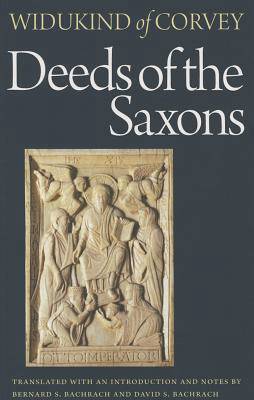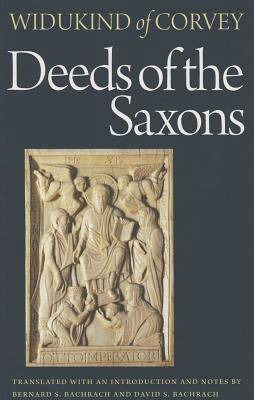
- Afhalen na 1 uur in een winkel met voorraad
- Gratis thuislevering in België vanaf € 30
- Ruim aanbod met 7 miljoen producten
- Afhalen na 1 uur in een winkel met voorraad
- Gratis thuislevering in België vanaf € 30
- Ruim aanbod met 7 miljoen producten
Omschrijving
Translated with an Introduction and Notes by Bernard S. Bachrach and David S. Bachrach
Widukind, a monk at the prominent monastery of Corvey in Saxony during the middle third of the tenth century, is known to posterity through his Res gestae Saxonicae, an exceptionally rich account of the Saxon people and the reigns of the first two rulers of the Ottonian dynasty, Henry I (919-936) and Otto I (936-973). Widukind, likely of noble birth, received a thorough education in both biblical and classical texts. When writing the Gestae, Widukind also had available the extensive library at Corvey, with its large collection of ancient texts as well as numerous works from the eighth and ninth centuries. Widukind drew on these, and even more contemporary written sources to complement and inform orally transmitted information that he received from many sources including people closely associated with the Ottonian royal court. Widukind wrote the Res gestae from the 950s to the 970s, incorporating additional material as he obtained further information and as major new events took place in the German kingdom and beyond. After providing a historical background for the Saxon people Widukind devotes most of his attention to the political and military affairs of the German kingdom, concentrating heavily on affairs of the royal court. Widukind provides information that can be found in no other source. His close relationship with the royal court enabled him to provide an "insider's" view of the people and events that shaped the political and military history of the most powerful kingdom in Europe. As a consequence, the Res gestae is an indispensable account for the history of the German kingdom during the tenth century. Bernard S. Bachrach and David S. Bachrach provide an introduction to the text that contextualizes the author, his historical methods, and the information that he provides. They draw on a large number of other written sources of information, including both narrative works and the political, economic, social, and military affairs of the day, and provide an extensive apparatus of notes.
ABOUT THE TRANSLATORS
Bernard S. Bachrach is professor of history, ancient studies, religious studies, and Jewish studies at the University of Minnesota. David S. Bachrach is associate professor of history at the University of New Hampshire.
Specificaties
Betrokkenen
- Auteur(s):
- Uitgeverij:
Inhoud
- Aantal bladzijden:
- 216
- Taal:
- Engels
- Reeks:
Eigenschappen
- Productcode (EAN):
- 9780813226934
- Verschijningsdatum:
- 25/11/2014
- Uitvoering:
- Paperback
- Formaat:
- Trade paperback (VS)
- Afmetingen:
- 69 mm x 269 mm
- Gewicht:
- 272 g

Alleen bij Standaard Boekhandel
Beoordelingen
We publiceren alleen reviews die voldoen aan de voorwaarden voor reviews. Bekijk onze voorwaarden voor reviews.











